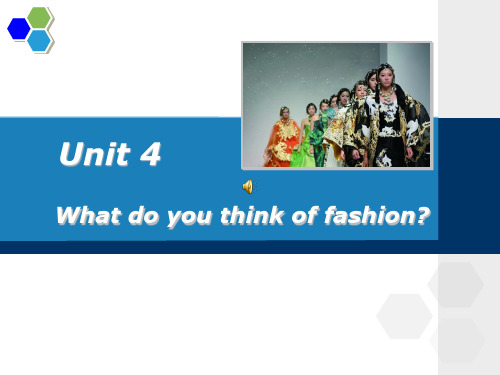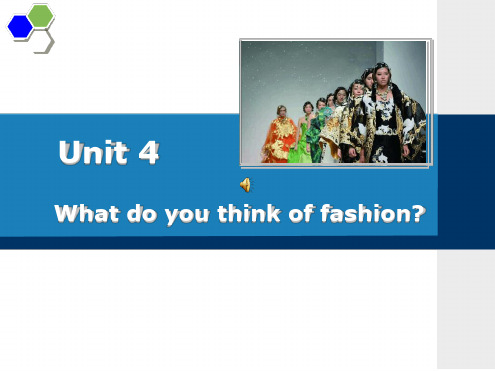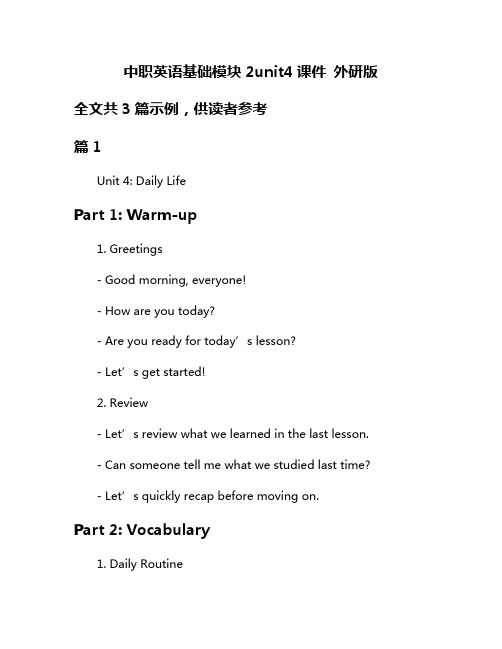外研版中职国规英语教材基础模块第二册第4单元
外研版中职国规英语教材基础模块第二册第4单元

外研版中职国规英语教材基础模块第二册第4单元
Unit 4 Language that Matters
一、单元整体解读及分析
二、分课时教学设计
第1课时
第2课时
第3课时
第4课时
第5课时
第6课时
作者简介:杨娜,1984年出生于陕西汉中,2006年毕业于西北大学。
2006年8月至2007年7月在大连一外企工作,主要从事幼儿及初中英语教学软件推广及配套教材和练习册的编写。
2007年8月至今在大连市经济贸易学校工作,主要从事中专和大专英语的教学工作。
曾教过的课程有基础英语、面试英语、会展英语、旅游英语、民航英语和新概念英语。
参与编写校本教材《会展英语》和《面试英语》。
unit_4职高英语基础模块2unit4

THNK YOU
汇报人:XX
06
PPT的总结和评价
主题:unit_4职高英语基础模块 2unit4
PPT的总结
特点:注重实用性和可操作性, 适合职高学生使用
添加标题
添加标题
添加标题
添加标题
内容:包括词汇、语法、阅读、 写作等方面的知识
评价:内容丰富,讲解清晰,易 于理解,有助于提高学生的英语 水平
PPT的评价和建议
内容丰富,逻辑清晰 设计美观,色彩搭配合理 动画效果适当,不喧宾夺主 建议增加互动环节,提高观众参与度 建议在关键信息处添加标注,便于观众理解 建议对PPT进行定期更新,保持内容的新鲜度和时效性
路径动画:让元素沿着 特定路径移动
缩放动画:让元素进行 缩放
颜色动画:让元素进行 颜色变化
动画触发器:设置动画 的触发条件,如点击、
鼠标悬停等
进入动画:让元素以各 种方式进入PPT
退出动画:让元素以各 种方式退出PPT
旋转动画:让元素进行 旋转
动画效果选项:调整动 画的速度、延迟、重复
等参数
透明度动画:让元素进 行透明度变化
结论:总结 PPT的制作 和演示技巧, 强调PPT在 职高英语教 学中的应用 和重要性
各章节的主题和内容
第一章:介绍PPT的基本概念和 用途
第三章:分析PPT
添加标题
添加标题
第二章:讲解PPT的制作过程和 技巧
第四章:探讨PPT在实际工作中 的应用和价值
03
unit_4职高英语基础模块 2unit4.ppt
汇报人:XX
目录
01 P P T 的 标 题 和 内 容 概 述 02 P P T 的 章 节 和 主 题 03 P P T 的 布 局 和 设 计 04 P P T 的 动 画 和 交 互 05 P P T 的 演 示 和 讲 解 06 P P T 的 总 结 和 评 价
外研社中职英语基础模块修订版PPT UNIT4讲课讲稿

do在句中表示强调,意为“确实,真的”。
该句包含一个when引导的时间状语从句,attend a job interview:参加工作面试。
Listening and Speaking
3 Listen again and act. 再听录音,根据提示表演对话。
yellow sweater; like travelling; casual style; sweaters and jeans; make me feel relaxed
cap
帽子
Warming up
earrings
耳环
Warming up
handbag
手提包
Warming up
sunglasses
太阳镜
Warming up
necklace
项链
1. Tom always wears a pair of sunglasses in summer.
汤姆夏天总是戴一副太阳镜。
1. talk about fashion; 2. describe fashion styles.
Warming up
1 Listen and match. 听录音,将下列词语与图片匹配。
necklace sunglasses
cap handbag earrings
Key sentences:
Warming up
adv. 正式地 adj. 休闲的
classy
adj. 放松的
graceful
adj. 美的
match n. & v.搭配 energetic adj. 充满活力的
Listening and Speaking
2 Listen and practice. 听录音,练习谈论着装。
外研社中职英语基础模块修订版 UNIT4学习资料

Listening and Speaking
4 Listen and practice. 听录音,练习谈论如何得体着装。
Betty: I'm going to my friend's birthday party. I want to look classy and graceful. Could you give me some advice?
李薇 我喜欢时尚,并努力跟上最新
的时尚。穿漂亮的衣服让我更加自 信。
wearing beautiful clothes 是动名词结构,在句中作 主语。同样用法的句子还有:In my opinion, making some DIY things is fashionable.
Reading and Writing
Jack
I am a terrible sports fan. I like to dress like those stars. For example, my basketball T-shirt number is 7, which is the number of Jeremy Lin.
杰克 我是一个狂热的体育迷。我喜
2. Mary's handbag matches her dress very well.
玛丽的手提包和她的连衣裙搭配地非常漂亮。
Warming up
2 Discuss and tick. 讨论并选出你认为体现时尚的五
个因素。
√ clothes
√
√ way of behaviour
Reading and Writing
3 Read and learn. 读下文,了解时尚的变迁。
中职英语基础模块2(修订版)第四单元Unit 4单词

基础模块2(修订版) U4 Volunteer Work
responsible public
knowledge organization
include
responsible
/rɪˈspɒnsəbl/ adj. 有责任心的
基础模块2(修订版) U4 Volunteer Work
responsible public
knowledge organization
include
public
/ˈpʌblɪk/ n. 公众
基础模块2(修订版) U4 Volunteer Work
responsible public
knowledge organization
include
knowledge
/ˈnɒlɪdʒ/ n. 知识
基础模块2(修订版) U4 Volunteer Work
apply activity volunteer amazing graduate
amazing
/əˈmeɪzɪŋ/ adj. 令人惊奇的
基础模块2(修订版) U4 Volunteer Work
apply activity volunteer amazing graduate
inform participation department
inform
/ɪnˈfɔːm/ v. 通知
基础模块2(修订版) U4 Volunteer Work
exhibit electronic
inform participation department
participation
/pɑːˌtɪsɪˈpeɪʃn/ n. 参加; 参与
基础模块2(修订版) U4 Volunteer Work
中职英语基础模块2 Unit 4 I've tried all the means of transportation PPT

5. Listen and complete. 再听录音,并填写Sara的观点
Public Transportation in Shanghai
Sara’s Opinion
Subway
comfortable
Light rail
fast
Taxi
A bit expensive, but the service was very good.
taxi
plane
train
light rail
bus
boat
• 四单元录音材料 • Tang Hua: Hi, Sara! How was your holiday? • Sara: Great! I have just come back from my trip to Shanghai. • Tang Hua: Did you go there by air? • Sara: Oh no, I went there by train. • Tang Hua: Have you ever been to Shanghai before? • Sara: Yes, I have been there three times. • Tang Hua: What is the transportation like in Shanghai? • Sara: It has changed a lot since 1999. Shanghai has built more light rails
6. Listen and underline.
Bob: It’s good. The transportation in Beijing has changed a lot. There are more subways and light rails.
中职英语基础模块2unit4课件 外研版

中职英语基础模块2unit4课件外研版全文共3篇示例,供读者参考篇1Unit 4: Daily LifePart 1: Warm-up1. Greetings- Good morning, everyone!- How are you today?- Are you ready for today’s lesson?- Let’s get started!2. Review- Let’s review what we learned in the last lesson.- Can someone tell me what we studied last time?- Let’s quickly recap before moving on.Part 2: Vocabulary1. Daily Routine- Brush teeth- Wash face- Have breakfast- Go to work/school- Have lunch- Do homework/study- Have dinner- Take a shower- Go to bed2. Expressions- What time is it?- What’s the date today?- Have a good day!- Good night!- See you later!Part 3: Listening Practice1. Listening Comprehension- Listen to the audio and answer the questions.- Pay attention to the keywords and try to understand the main ideas.2. Dialogue Practice- Work with a partner to practice the dialogues.- Pay attention to pronunciation and intonation.Part 4: Grammar1. Present Simple Tense- I brush my teeth every morning.- She goes to work by bus.- We have dinner at 7 o’clock.- They study English on weekends.2. Time Expressions- Every day/week/month- In the morning/afternoon/evening- At 6 o’clock/12 noon/midnight- On Monday/Tuesday/FridayPart 5: Speaking Practice1. Interview Activity- Interview a classmate about their daily routine.- Take notes and share with the class.2. Role Play- Act out a typical day in your life.- Use the vocabulary and expressions we’ve learned. Part 6: Writing Task1. Daily Journal- Write a journal entry about your day.- Include details about your routine and any special events.2. Email Writing- Write an email to a friend describing what you did today.- Use the present simple tense and time expressions. Part 7: Review Game1. Daily Life Quiz- Test your knowledge with a fun quiz.- Earn points for correct answers and compete with your classmates.2. Wrap-up- That’s all for today’s lesson. Well done, everyone!- Remember to practice what we’ve learned and review for the next class.- See you next time! Have a great day!篇2Unit 4: Making PlansPart 1: VocabularyIn this unit, we will learn some vocabulary related to making plans. Let's start with some common words and phrases:1. Arrange: to make plans or preparations for somethingExample: We need to arrange a meeting to discuss the project.2. Schedule: a plan that shows the times that events will happen or the things that people have to doExample: What's your schedule for tomorrow?3. Confirm: to say or show that something is true or correctExample: Please confirm your attendance at the meeting.4. Reschedule: to set a new time or date for something that has been plannedExample: We had to reschedule the meeting for next week.5. Postpone: to arrange for something to happen at a later time than originally plannedExample: The concert has been postponed due to bad weather.6. Cancel: to decide that an event will not happenExample: The workshop has been canceled due to low attendance.Part 2: GrammarIn this unit, we will also learn some grammar structures used for making plans. Let's look at a few examples:1. Present Continuous for Future ArrangementsWe use the present continuous tense to talk about future plans that are already fixed or arranged.Example: I'm meeting Sarah for lunch tomorrow.2. Going To for Future PlansWe use "going to" to talk about future plans that we have already decided or intend to do.Example: I'm going to study abroad next year.3. Will for Future DecisionsWe use "will" to make decisions at the moment of speaking.Example: I'll call you when I arrive.Part 3: Speaking PracticeNow, let's practice making plans using the vocabulary and grammar structures we have learned in this unit. Here are some conversation prompts to help you get started:1. What are your plans for this weekend?2. Have you arranged your schedule for next week?3. Are you going to attend the party on Saturday?4. Do you need to reschedule our meeting?5. Will you confirm your attendance at the event?Remember to use the vocabulary and grammar structures we have learned to communicate effectively when making plans. Good luck!篇3Unit 4 of the Basic Module 2 of Vocational English in the New Foreign Version covers a variety of topics related to work and employment. In this unit, students will learn how to describe job responsibilities, discuss career goals, and understand workplace etiquette.The unit begins with a discussion on different types of jobs and industries, helping students expand their vocabulary related to work. They will learn common job titles and descriptions, as well as the skills and qualifications needed for various professions.Next, students will explore the concept of job responsibilities and how to effectively communicate these to others. They will practice using modal verbs to express obligations and duties in the workplace, as well as discuss the importance of teamwork and collaboration in achieving common goals.Following this, the unit delves into the topic of career goals and aspirations. Students will learn how to talk about theirlong-term career objectives and the steps they need to take to achieve them. They will also discuss the importance of continuous learning and professional development in pursuing a successful career.Additionally, the unit covers workplace etiquette and professional communication. Students will learn how to communicate effectively with colleagues and supervisors, as well as handle conflicts and feedback in a constructive manner. They will also explore the dos and don'ts of office conduct, including appropriate dress code and email etiquette.Overall, Unit 4 of the Basic Module 2 of Vocational English in the New Foreign Version provides students with the necessary language skills and cultural awareness to succeed in the modern workplace. By mastering the concepts and practicing the language exercises in this unit, students will be better equipped to navigate the complexities of the professional world and achieve their career goals.。
外研版中职国规英语教材基础模块第二册第4单元

外研版中职国规英语教材基础模块第二册第4单元
Unit 4 Language that Matters
一、单元整体解读及分析
二、分课时教学设计
第1课时
第2课时
第3课时
第4课时
第5课时
第6课时
作者简介:杨娜,1984年出生于陕西汉中,2006年毕业于西北大学。
2006年8月至2007年7月在大连一外企工作,主要从事幼儿及初中英语教学软件推广及配套教材和练习册的编写。
2007年8月至今在大连市经济贸易学校工作,主要从事中专和大专英语的教学工作。
曾教过的课程有基础英语、面试英语、会展英语、旅游英语、民航英语和新概念英语。
参与编写校本教材《会展英语》和《面试英语》。
- 1、下载文档前请自行甄别文档内容的完整性,平台不提供额外的编辑、内容补充、找答案等附加服务。
- 2、"仅部分预览"的文档,不可在线预览部分如存在完整性等问题,可反馈申请退款(可完整预览的文档不适用该条件!)。
- 3、如文档侵犯您的权益,请联系客服反馈,我们会尽快为您处理(人工客服工作时间:9:00-18:30)。
外研版中职国规英语教材基础模块第二册第4单元
Unit 4 Language that Matters
一、单元整体解读及分析
二、分课时教学设计
第1课时
第2课时
第3课时
第4课时
第5课时
第6课时
作者简介:杨娜,1984年出生于陕西汉中,2006年毕业于西北大学。
2006年8月至2007年7月在大连一外企工作,主要从事幼儿及初中英语教学软件推广及配套教材和练习册的编写。
2007年8月至今在大连市经济贸易学校工作,主要从事中专和大专英语的教学工作。
曾教过的课程有基础英语、面试英语、会展英语、旅游英语、民航英语和新概念英语。
参与编写校本教材《会展英语》和《面试英语》。
